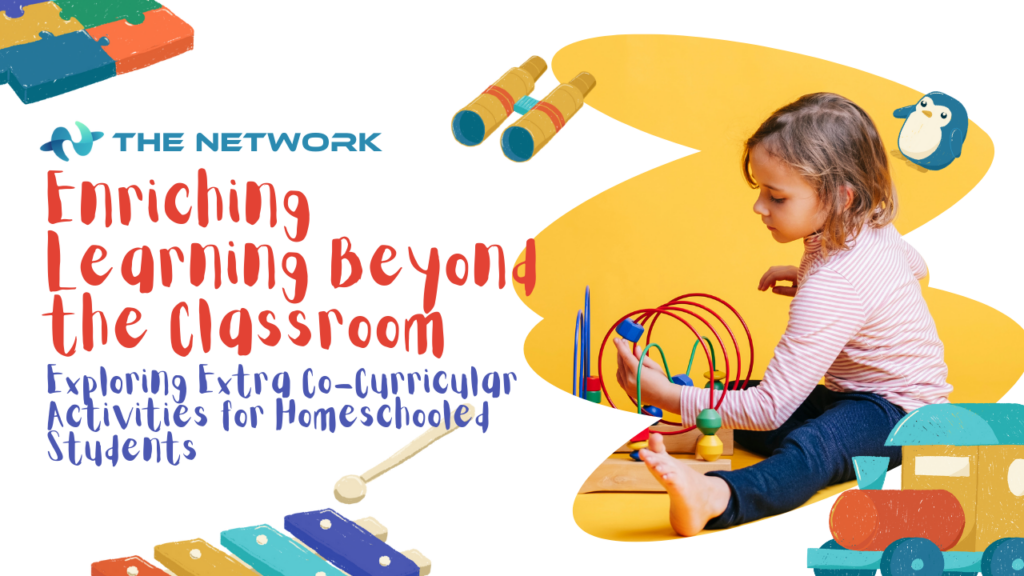Exploring Extra Co-Curricular Activities for Homeschooled Students: Enriching Learning Beyond the Classroom

Homeschooling offers a unique opportunity for students to tailor their educational experiences, focusing not just on traditional academic subjects but also on extra co-curricular activities that can enrich their overall development. Engaging in activities outside of the typical curriculum can foster creativity, critical thinking, and social skills, while also providing avenues for exploration and personal growth. In this blog post, we’ll delve into the world of extra co-curricular activities for homeschooled students, exploring their benefits, practical implementation, and considerations for parents and students alike.
Benefits of Extra Co-Curricular Activities
- Holistic Development: Extra co-curricular activities contribute to a well-rounded education, allowing students to develop skills beyond academics, such as leadership, teamwork, and time management.
- Exploration of Passions: Homeschooling provides flexibility for students to pursue their interests deeply. Extra activities offer avenues for exploring passions, whether in sports, arts, music, or academic pursuits like robotics or debate.
- Socialization Opportunities: Contrary to misconceptions, homeschooling doesn’t isolate students. Extra activities provide ample opportunities for social interaction, allowing students to form friendships, collaborate with peers, and learn to navigate diverse social environments.
- Enhanced Learning: Many extra activities integrate elements of traditional subjects in practical ways, reinforcing academic concepts through hands-on experiences. For example, participating in a gardening club teaches botany and environmental science.
- Building Resumes and Portfolios: Engagement in extra co-curricular activities enhances college applications and resumes, showcasing a student’s diverse skills and interests, which can be particularly advantageous for homeschooled students.
Co-Curricular Activities For Home Schooled Students
- Sports Teams: Joining local sports teams or leagues allows students to participate in organized athletics, fostering physical fitness, teamwork, and sportsmanship. Options may include soccer, basketball, swimming, track and field, or martial arts.
- Music Lessons and Ensembles: Learning to play a musical instrument or participating in choir, band, or orchestra provides opportunities for artistic expression, discipline, and collaboration. Students can explore various genres and styles, honing their skills under the guidance of experienced instructors.
- Art Classes and Workshops: Taking art classes or workshops exposes students to diverse artistic mediums such as painting, drawing, sculpting, ceramics, and photography. These activities encourage creativity, self-expression, and appreciation for the arts.
- Drama Clubs and Theater Productions: Engaging in drama clubs, acting workshops, or participating in theater productions nurtures performance skills, public speaking abilities, and empathy. Students delve into storytelling, character development, and stagecraft, building confidence and communication skills.
- Debate and Public Speaking: Participating in debate clubs, speech competitions, or mock trial teams hones critical thinking, research, and persuasive communication skills. Students learn to articulate arguments, analyze complex issues, and defend their viewpoints effectively.
- Volunteer Work and Community Service: Getting involved in volunteer activities, such as assisting at local charities, organizing community events, or volunteering at hospitals or nursing homes, instills empathy, compassion, and a sense of social responsibility.
- STEM Clubs and Workshops: Joining STEM (Science, Technology, Engineering, and Mathematics) clubs or participating in workshops and competitions introduces students to hands-on experimentation, problem-solving, and innovation. Activities may include robotics, coding, science fairs, or engineering challenges.
- Outdoor Adventure Programs: Enrolling in outdoor adventure programs, wilderness expeditions, or scouting groups promotes physical fitness, leadership skills, and environmental stewardship. Students learn outdoor survival skills, teamwork, and appreciation for nature.
- Language Learning Groups: Joining language learning groups or immersion programs allows students to explore new languages and cultures, fostering cross-cultural communication skills and global awareness.
- Writing Workshops and Literary Clubs: Participating in writing workshops, book clubs, or literary magazines nurtures creativity, literacy, and critical thinking. Students develop storytelling abilities, writing techniques, and literary analysis skills.
These are just a few examples of the diverse range of extra co-curricular activities available to homeschooling students. By exploring their interests and passions, students can embark on enriching learning experiences that complement their academic pursuits and foster holistic development.
School or Homeschool Learning Ideas
- Nature Exploration Club: Create a club focused on exploring local ecosystems, identifying flora and fauna, and understanding environmental conservation. Students can maintain observation journals, conduct experiments, and even participate in citizen science projects like bird watching or water quality testing.
- Entrepreneurship Workshop: Encourage students to develop entrepreneurial skills by organizing a workshop where they conceptualize and launch small businesses. From crafting handmade products to offering services like tutoring or pet sitting, students learn about budgeting, marketing, and customer service.
- Historical Reenactment Society: Dive into history by forming a reenactment society where students research, script, and perform historical events or figures. This hands-on approach fosters a deeper understanding of historical contexts while honing presentation and research skills.
- Community Service Projects: Engage students in meaningful service projects, such as organizing food drives, volunteering at local shelters, or participating in environmental clean-up efforts. These experiences instill empathy, civic responsibility, and a sense of purpose.
- STEM Challenge Competitions: Organize STEM challenges where students collaborate to solve real-world problems using science, technology, engineering, and math concepts. Competitions like building a solar-powered vehicle or designing a sustainable infrastructure model promote critical thinking and innovation.
What Our Children Need to Know
- Budgeting and Financial Literacy: Teach children about managing finances by involving them in household budgeting, encouraging savings goals, and discussing concepts like investing and debt management.
- Digital Citizenship and Online Safety: Equip children with essential digital literacy skills, including discerning credible information online, protecting personal data, and practicing responsible digital communication.
- Cultural Competence and Diversity: Expose children to diverse cultures, traditions, and perspectives through literature, arts, and community events, fostering empathy, respect, and understanding.
The Big Questions
- How can extra co-curricular activities be tailored to accommodate students with diverse learning needs?
- What role do parents play in supporting and facilitating their children’s participation in extra activities?
- How can homeschooling communities collaborate to offer a wider range of extra-curricular opportunities?
- What strategies can be employed to ensure that extra activities complement rather than compete with academic priorities?
- How do extra co-curricular activities contribute to long-term personal and professional success?
Conclusion
Extra co-curricular activities play a vital role in enriching the homeschooling experience, offering avenues for holistic development, skill-building, and personal growth. By embracing a diverse range of activities, homeschooling students can cultivate passions, foster social connections, and prepare for future endeavors. As parents and educators, it’s essential to prioritize these opportunities, recognizing their significance in nurturing well-rounded individuals equipped for success in an ever-evolving world.





Responses